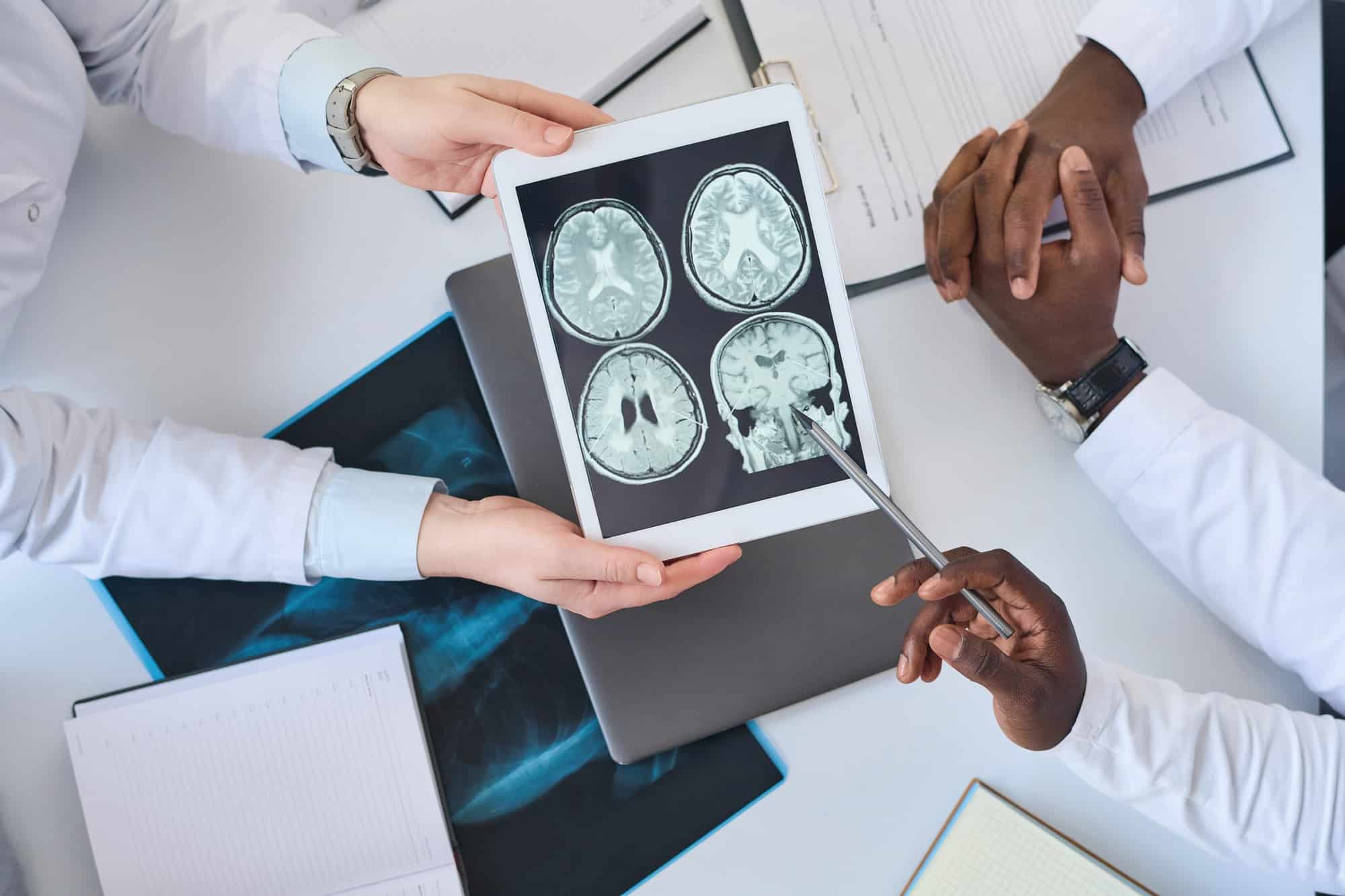NPH or Normal Pressure Hydrocephalus causes problems walking, thinking, and peeing. Symptoms can look like Alzheimer’s dementia or Parkinson’s disease and may easily be missed delaying diagnosis and surgical cure.
What is NPH or Normal Pressure Hydrocephalus?
NPH or Normal Pressure Hydrocephalus is a brain condition where the fluid cushioning the brain and spine called cerebral spinal fluid (CSF) builds up squeezing the brain making it hard to walk, think, and pee. Hydrocephalus is Greek for “water on the brain,” and Normal Pressure means the pressure in the brain is “normal,” but despite being normal it causes severe but potentially reversible symptoms including dementia so important to identify quickly and not be missed.
NPH is the most common form of Hydrocephalus in adults. Not all symptoms need be present to make the diagnosis but problems with walking and balance are very common and this in combination with an abnormal image of the brain or MRI helps make the diagnosis.
Why fluid builds up in special compartments of the brain called ventricles is not completely understood but usually happens later in life in about 2-4 % of people and up to 6 % of people over the age of 80. Symptoms share features of Alzheimer’s like difficulty with memory and movement problems that may be confused with Parkison’s disease. NPH is important to identify early on as is a surgically treatable disease. In fact, it’s called the “reversible,” dementia because it’s one of the few types of dementia that can be fixed.
What are the symptoms of NPH?
The hallmark of NPH includes walking problems, trouble thinking, and loss of bladder control. It’s called Hakim’s triad named after Dr. Solomon Hakim who first described NPH. These symptoms are found in 75 % of people with NPH. However, if you do not have walking or balance problems you likely do not have NPH as walking issues are key features of the disease.
NPH can make you feel weak, cause a tremor, disequilibrium or feeling off-balance with slowness of the legs and tends to get worse over time. Walking may seem magnetic with a sensation of “feet sticking to the floor.” In fact, one of the first symptoms to improve with surgery is the ability to walk.
When NPH impacts thinking or cognition it may lead to forgetfulness, memory issues, and emotional changes. Most of the cognitive problem improves significantly after surgery with the exception of people who have underlying severe dementia and, in fact, about 30 % of all people with NPH have Alzheimer’s disease or another form of dementia present at the time of diagnosis. The reason for this is unknown but Alzheimer’s disease may put people at higher risk for NPH.
Why do people get NPH?
NPH is a rare disease with risks increasing as we age with the highest risk in people above 80 years of age. NPH can be “idiopathic,” meaning caused by reasons we do not understand, or can happen because of another type of brain insult like a stroke, or infection like meningitis.
There are risk factors for idiopathic NPH including high blood pressure, head injury, heart failure, sleep apnea (a serious sleep disorder), lung disease and some sources say a large head size puts you at increased risk. Alzheimer’s disease may be seen in 30 % of people with NPH and schizophrenia is reported in Finland to be three times more common.
The good news is that NPH is potentially curable with surgery, and certain factors may help predict outcome including having symptoms less than 6 months, problems with walking and balance only, having minimal thinking or cognitive problems at the time of diagnosis and showing a positive benefit following a procedure called a “tap,” test. A tap test is when a small amount of cerebral spinal fluid (CSF) is removed from the spine under sterile conditions and the patient is observed for signs of recovery. If, for example, walking gets better after a “tap,” test this a good sign that surgery or placing a permanent tap or shunt to relieve the fluid buildup will lead to long lasting improvement in symptoms or cure.
How to treat NPH?
NPH is one of the few reversible neurological diseases that gets better with surgery or “shunt,” placement and its advisable in most cases. Some sources say walking improves in 85 % of people, cognition or thinking in 80 %, and bladder problems if treated in early stages by 80 %.
Treatment includes surgical insertion of a shunt or tube that goes from the brain or the spine that “shunts,” the buildup of extra spinal or brain fluid. This relieves the extra fluid pushing on the brain and vital nerve tracts and improves neurological symptoms. In a recent article by Clinical Neurology and Neurosurgery, a group of elderly patients over the age of 80 years with NPH treated with a “shunt,” had relatively good survival with most living on average 7.7 years or longer. The major cause of death was pneumonia, stroke, and senility not NPH or complications of surgery. In terms of functional status, even though most benefited from “shunt,” surgery they did show slow decline in activities of daily living (ADL) over time.
Any final advice on NPH?
NPH is a rare disease afflicting about 2-4 % of people with the highest rate seen in people over the age of 80. There are two types, the classic or idiopathic type that impacts older people, and a second type caused by other diseases like stroke, or brain infections that can happen at any age. The 3 major signs of NPH are difficulty walking, thinking, and peeing.
It can often be confused with other neurological diseases like Alzheimer’s which affects memory, and Parkinson’s that affects movements. Brain imaging especially an MRI is critical in making the right diagnosis as shows classic findings of significantly enlarged brain ventricles or spaces in the brain. The diagnosis of NPH is based on symptoms, abnormal brain imaging on MRI, and testing the spinal pressure which should be “normal.”
Once diagnosed, important to see a Neurologist or Neurosurgeon to decide the best individualized treatment option for you. If surgery is performed, it’s important to include physical therapy in the recovery phase for best results. And, to know that you are not alone as Billy Joel was recently diagnosed with NPH and by reports is on the road to recovery. His symptoms were the typical findings of balance issues but also experienced problems with hearing and sight.
If you have new neurological symptoms as Billy Joel did and millions of others, including difficulty walking or thinking it’s important to seek medical attention immediately. NPH unlike other neurological diseases and dementias is potentially reversible. It’s a disease not to be missed.
If you have any questions, AskDoctorH we are here to help.




 Have Questions? AskDoctorH
Have Questions? AskDoctorH